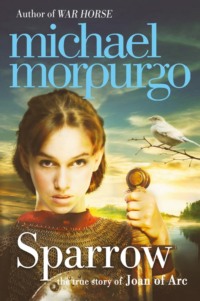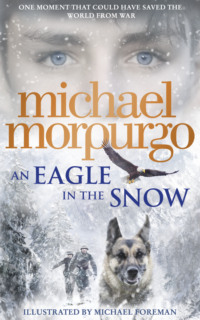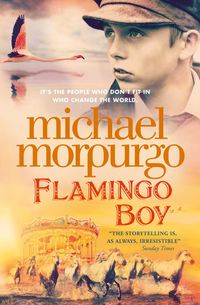
Полная версия
Unforgettable Journeys: Alone on a Wide, Wide Sea, Running Wild and Dear Olly
She was sitting there, rocking back and forth in her chair by the stove, her dog on her lap. On the table near us by the window were all the Sunday cakes she’d made. She was trying to stop herself sobbing by singing. It was very soft, but we could hear it well enough to recognise it: What a friend we have in Jesus. Verse after verse she sang, but punctuated always by fits of sobbing that wracked her whole body. There was one moment when she lifted her eyes and cried out loud: “Why, sweet Jesus? Why? Please take this cup from me, Jesus. Please take it.” That was when I saw the purple bruise on her chin, the livid marks on her neck and some blood on her lip too. She was clasping her hands and praying. I remember thinking then that I wanted Piggy Bacon dead, that one day I would kill him. I never made actual plans to do it of course, but I felt like doing it, and so did Marty, and Wes too.
What he did next could so easily have made a murderer of me, if I’d had the means, if I’d had the courage, if circumstance hadn’t intervened.

Mrs Piggy to Ida
It was Christmas time – our second Christmas on the farm – about eighteen months or so after we arrived at Cooper’s Station. For lunch on Christmas Day, Piggy Bacon and Mrs Piggy sat at opposite ends of our long trestle table and ate with us. We’d had the day off – in all we were given three days off in the year: Piggy Bacon’s birthday, Easter Sunday and Christmas Day. The morning had been all carols and prayers, and of course sermons too, just like a normal Sunday, except that I liked the carols a lot better than some of the dreary hymns we usually sang. We had sausages and mashed potatoes and gravy, and then jam roly-poly and custard afterwards, and all the lemonade we wanted. The best feast of my childhood; I’ve never forgotten it. With Piggy and Mrs Piggy there we none of us of said a word, of course, none of us dared. But I don’t think any one of us wanted to talk much anyway – we were all far too busy eating our fantastic feast to have any time at all for conversation. We were savouring every mouthful. Ever since that Christmas Day I’ve always loved sausages.
It happened after the meal. As usual one of us had to stand up and say grace, not just before but after each meal as well. It happened to be my turn that day, and Piggy Bacon made me say it all over again because I’d mumbled it. “Say it loud to the Lord,” he told me, “and he will hear you.” So I did. Then he stood up himself, cleared his throat and announced that they had decided to give us each a Christmas present, “A gift from the Lord,” he said, a gift that we could keep with us and treasure all our lives. Then he showed us what it was. Dangling there from his forefinger on a piece of cord was a small wooden cross. “From now on every one of you will wear this every day.
This is the badge of Jesus and you will wear it with pride,” he said.
One by one we were summoned up to receive our present. He hung a cross around each of our necks. We said thank you, shook his hand and went to sit down again. Except for the thank yous the whole ceremony was conducted in an awkward silence. Mrs Piggy, who was standing meekly at his side with a bunch of crosses hanging from her wrist, handed a cross to him as each of us came up. I noticed she kissed each one before she gave it to him. Then I was called up. I was standing there waiting for my cross, looking up into Piggy Bacon’s face, when suddenly his whole expression altered. “What’s this?” he roared, and lunging forward he grabbed my key from around my neck and with one violent pull jerked it off.
“That’s mine,” I cried, reaching out to grab it back. He held it out of my reach, examining it, puzzling over it.
“A key? What for? A key to what?”
“It’s my lucky key,” I told him. “Kitty gave it to me, my sister in England.”
“Luck!” Piggy Bacon thundered. “Luck is magic, and all magic is the devil’s work. There is no such thing as luck. It is God who makes all things happen, in this life and afterwards too.” I kept trying to jump up and snatch it from him, but he was still holding it too high. “It’s a lucky charm, which is devil’s magic, witchcraft, mumbo jumbo. You will wear a cross or nothing at all.”
“Then,” I said, surprised at my own sudden courage, “then I won’t wear anything at all.” And I turned and walked away. He strapped me that evening of course, and afterwards I had to bend my head in front of him as he put the cross around my neck. He said that if he ever saw me not wearing it, he’d strap me again. “What about my key?” I asked him.
“I’ve thrown it out,” he said. “It’s where all witchcraft belongs, in the rubbish.”
That night I cried myself to sleep. Neither Wes nor Marty could comfort me. My precious key was gone, gone for ever, and I felt utterly alone in the world without it, like my last roots had been ripped out. As I lay there that night in the darkness I had murder in my heart. And I don’t just mean I hated Piggy Bacon. I mean I really wanted to kill him. I might well have done it too. I had found the courage now – revenge and fury gives you powerful courage – but I just couldn’t think how to do it. I had no idea how I could murder him, not yet, but I was determined to find some way to do it and do it soon. Luckily for him, luckily for me too, it didn’t come to that. Luck intervened, or fate, or circumstance, call it what you like, and when it came, it came from a most welcome and unexpected source.
When I’d first come to Cooper’s Station I’d been terrified of snakes, and of spiders in particular. Every day we’d see all manner of strange and wonderful creatures out on the farm, from wallabies to wombats. But it was spiders and snakes I looked out for. We’d see them everywhere, snakes curled up under the dormitory block or slithering along between the boulders down by the creek. Spiders, we discovered, loved the toilet, which was a shed with a corrugated iron roof built on to the side of the dormitory block. It was baking hot in there and stank to high heaven, but it was the spiders I hated, the spiders I feared. I feared them so much that I tried not to go to the toilet. Whenever I could I would try to go outside to do my business. Sometimes though, I was in a hurry and the toilet was nearby and I’d risk it. But I’d do it quickly, as quickly as I could, trying not to breathe in, and trying not to look for spiders.
They say you never see the bullet that gets you. It’s the same with spiders. I was told later it was a redback spider. I was sitting there on the toilet. It happened when I stood up. I was pulling up my shorts and I felt it bite my foot, felt the stabbing surging pain of it, saw it scurrying away. I screamed then and ran out. I remember stumbling to my knees and Mrs Piggy running towards me.
I’ve no idea how long I lay in bed. Marty told me later that they all thought I was going to die. I do remember realising I wasn’t in my own bed, that there were curtains and pictures on the wall, and a big cupboard. I remember too Mrs Piggy coming in and sitting with me, and I felt hot and heavy all over as if I was weighted down somehow. And once when she came she wasn’t alone. She had an Aboriginal man with her, a bushman with white hair, and he looked into my eyes and felt my face and gave me a medicine to take and laid some kind of a poultice on my foot. The medicine tasted so bitter I could barely swallow it. But whatever it was that he put on my foot cooled it wonderfully.
As I got better Mrs Piggy would sit beside me playing her squeezy box and I loved that. All these memories may well not be memories at all. It was Mrs Piggy who told me afterwards when I was better, when I thanked her for looking after me, that it wasn’t her that had cured me at all,but a “black fellow” she’d called in. He’d saved my life, she said, not her. “And don’t say a word to Mr Bacon,” she said. “He wouldn’t like it. He doesn’t believe in their magic. But I do. There’s room for all sorts of magic and miracles in this world – that’s what I think.”
I’d spent the best part of a month in my sick bed in the farmhouse, so Marty told me later. He said that both Wes and he had agreed it would be almost worth a spider bite or a snake bite if it got you a month’s holiday in the farmhouse. I told them everything, about how well I’d been fed and looked after, about Mrs Piggy nursing me and how kind she’d been, and all about the bushman who’d saved my life with his magical medicine. And I told them too about the last thing Mrs Piggy had done the morning I was to leave the farmhouse. She came up to my room. I was sitting on the bed buttoning my shirt.
“Here,” she said. “This is yours, I think.” And she handed me a tiny box, like a pill box. I opened it, and there was my key lying in a bed of cotton wool. “Hide it,” she told me. “And hide it well.” She said nothing more, and was gone out of the room before I could even thank her.
I never referred to her after that as Mrs Piggy, nor did anyone else because very soon everyone knew how good a person she really was, how she’d found my key, looked after it, and given it back to me. She was Ida after that, Ida to all of us. We all knew from then on that we had in her a true friend, but we didn’t know just how good a friend, just how important a friend she was to be to us. We had many more gruelling months to endure before we were to find that out. And now I had my key back I forgot all about killing Piggy Bacon. So I suppose you could say Ida didn’t just save my life, she saved his. Much good did it do her.
As for my key, I did as Ida had told me, I hid it well. But I kept it close too. Right above my bed there was a window, and above it a wooden lintel with a narrow split at one end, but it was just wide enough. I pushed my key in deep, so it couldn’t be seen, making quite sure Piggy could never find it, and left it there. But it never left my thoughts. Every night before I got into bed I’d look up at my secret place. I told Marty – no one else.

“Only One Way Out”
We could see it happening right in front of our eyes, every day, every night. And we didn’t do nearly enough to prevent it. There’s a lot in my life I regret, a lot to feel guilty about – too much. But I don’t think anything troubles me more than what happened to Wes Snarkey at Cooper’s Station. I still have dreams about it, and about him, all these years later. I should have seen it coming. I should have had the courage to stand beside him, but I didn’t. Nor did Marty, and nor did any of us, except Ida. At least Ida tried.
It all went back, I’m sure, to that glorious day when Wes knocked Piggy Bacon down in the yard, then sat on him and clobbered him. Wes became our hero that day, but he also replaced Marty as Piggy’s favourite victim. He would bawl him out all the time, pick on him at every opportunity. Wes found himself chosen for the worst jobs, the ones we all dreaded, the dirtiest, the heaviest, the smelliest: cleaning out the latrine, digging ditches, carting stones. And Piggy was as clever about it as he was vicious. He knew how Wes loved to work near Big Black Jack in the stables. Everyone knew it. Wes had made no secret of his love for the horse, so Piggy deliberately saw to it that he was never anywhere near his paddock or the stable. And he made sure as well that Wes worked mainly on his own. He deliberately set out to isolate him from the rest of us.
Hardly a day went by when Wes wasn’t hauled out in front of all of us at evening punishment parade. Sometimes Piggy would just bellow at him. Sometimes he would take the strap to him and give him a hiding. He’d always find some excuse, any excuse to punish him. We could all see Wes was getting it a lot harder then the rest of us. And Piggy was enjoying it too – I saw it in his face. When he whacked Wes it was always done with more venom, more violence. Thinking back, I’m ashamed to say there was even a sense in which I felt a little relieved because while Wes was on the receiving end, then at least I wasn’t.
Wes grew in stature in our eyes with every whack of Piggy’s belt. He never once flinched, never once complained, and so far as we knew he never even cried. For long weeks and months, it was his resistance and his defiance in the face of our hated enemy that kept us going and gave us all hope. I longed for the day that he’d have a go at Piggy again. I was sure he would. I thought, and Marty did too, that Wes was just biding his time, picking the right moment.
Then I began to notice that Wes was becoming more and more silent, more withdrawn, even with Marty and me, and we were his best friends. It happened slowly, so slowly that it was difficult at first to believe it was really happening. To start with I thought it was just because he was never allowed to be in the same working party as Marty and me, so we were simply seeing less of him. He often wasn’t with us during playtime either – Piggy regularly made him work on longer than the rest of us. And even when we were together, in the dormitory, Wes seemed to be shutting himself off from us. We’d been a threesome, all pals together, but now however much Marty and I tried to include him – and we did – we could both feel him slipping away from us and turning in on himself.
In time he became almost a stranger to us, a loner, just as he’d been before during those first months at Cooper’s Station. We wanted him to be one of us again because we liked him, and also because we admired him for how he was facing down the loathsome Piggy Bacon, and humiliating him every day on our behalf. I thought maybe he was dealing with it in his own way, bearing it stoically and in silence. I thought he could take it. I was wrong.
One morning Wes wouldn’t get up for roll call. He lay in his bed and wouldn’t move. Marty and I tried to persuade him, but he ignored us. He just turned his face away from us. We knew what would happen. Later after roll call, we were all standing out there in the cold of dawn, listening to Piggy inside the dormitory doing his worst. We heard him whacking Wes, yelling at him. “You asked for it, you little devil! I’ll teach you. If it’s the last thing I do, I’ll teach you. No work, no food. See how you like that!” Every phrase was punctuated by the swish and whack of his stick. He was giving Wes a real pasting, and to our shame we just stood there and let it happen.
Then we heard Wes talking back, a steely calm in his voice. “I won’t work for you, not ever again. And I won’t eat your rotten food either. You can keep it.” Moments later Piggy came storming out of the dormitory hut on to the verandah. He stood there surveying us all breathlessly, his face a beacon of rage.
For days Wes lay there refusing to get up, and every morning Piggy would go in and beat him, and every day he stopped his food too. To begin with Marty and I tried to squirrel away something for him, bread crusts perhaps. But Wes just shook his head. He wouldn’t touch anything. He told us we shouldn’t do it because we’d only get into trouble ourselves. And anyway, he said, there was no point, because he meant what he’d said: he wouldn’t touch Piggy’s food, even if it came secretly from us. He would stay on hunger strike, he said, until Piggy Bacon treated us properly and stopped beating us. He would drink water though. So we’d bring him that as often as we could. We kept bringing food too but it was no use. He’d made up his mind, he said, and nothing would change it. He would sometimes smile at us, but weakly now as if we were kind strangers.
He would say very little, and as he weakened he said less and less. But he did say something one evening when we were all three there together, Marty and I sitting on his bed. He said, and I’ve never forgotten his words: “You know what I think. I think there’s only one way out of this place, and I’ve found it.” Marty asked him what he meant, but he wouldn’t say. We both of us tried again and again to talk him out of his hunger strike, but he was dead set on it. He wouldn’t listen. I know now we should have tried harder. We should have tried much harder.

“Did We Have the Children Here for This?”
In the end we went to the only person we thought might help. We went to the farmhouse to see Ida. We told her everything: how Wes was beaten each morning, how he was on hunger strike, how he could die if something wasn’t done soon. Even while she was listening to us, she was looking around nervously. I could tell she just wanted us gone. And I could tell too that she already knew everything we’d been telling her. “You shouldn’t be here,” she said when we’d finished. “Go now, go quickly, before someone sees you. I’ll see what I can do.” And she closed the door and went back inside, leaving us standing there. I told Marty that I was sure she’d find a way to help Wes somehow.
“She’d better,” he said, “or else he’ll be a gonner, that’s for sure.”
That same night after lock-up, Ida came to the dormitory. It was the first time she’d ever come inside at night. We heard the door unlock, saw the dancing light of her torch. All of us expected it to be Piggy Bacon on one of his occasional late-night patrols so we lay doggo, feigning sleep. “I’ve come to see Wes,” she whispered. “Which bed?”
When we heard who it was we all sat up. I took her there and showed her. She sat down on his bed and tried to talk to him. Wes didn’t respond at all, not at first. He wouldn’t even turn over and look at her. Everyone was there by now, gathered round his bed.
Ida put a hand on his shoulder. “I’ve brought you some cakes, Wes, and some milk,” she said. “Please, you must eat.” And she opened up the cake tin on her lap. “I’ve put a cherry on each one for you. You’ll like them.” Wes turned over then and looked up at her.
“I can’t,” he said. “If I eat, he’ll make me work. And I won’t work for him. Never again. Not ever.”
She tried. For an hour or more she did all she could to tempt him, to persuade him. She told him that God helped those who helped themselves, how she understood his suffering. “And I know that God does too,” she said, “because he has told me so. I prayed. I asked him what to do, and he said I must come to you and feed you. God loves us all, Wes. In our suffering, we must always remember that.”
But no amount of gentle persuasion would change his mind. Even her tears didn’t seem to move him. We could hear the tears in her voice as she pleaded with him, smoothing his hair all the while. Nothing she said or did made any difference. In the end she simply had to give up, just as we had before her.
We had often heard the sound of fury from the farmhouse late at night, but until now it had always been a one-sided battle, with only Piggy Bacon’s voice raging and roaring, then afterwards the sound of Ida sobbing and the dog whining. This time there were two voices raised, hers as loud and as angry as his. For the first time, Ida was giving as good as she got. We could hear her every word. “The boy will die!” she cried. “Do you want that? Did we have these children here for this?” I wasn’t the only one who felt like cheering her on.
“All children are sinful, born sinful,” Piggy railed back, “and these are more sinful than most. My task is to cleanse them of sin, to prepare them for heaven. I won’t spare the rod, because it is the only way they will learn. And the boy has to learn who is master here.”
“I thought Jesus was master here,” she argued. “Or did you forget that? You punish the boy only out of pride, and you know it.” And so it went on. Sadly though, it ended as it so often ended, with the sound of smashing crockery, of blows, and Ida’s sharp cries of pain and the dog yelping and whining. We knew Piggy was kicking him. Then silence, and sobbing.
Marty began the chorus, and raised to sudden courage we all joined in: “For she’s a jolly good fellow, for she’s a jolly good fellow, for she’s a jolly good fellow, and so say all of us.” We sang it out loud, again and again, at the top of our voices to be sure that Piggy could hear us. He heard all right. He came out of the farmhouse and bellowed at us to stop or he’d come over and whip the lot of us. So, cowed once more, we stopped. I felt even then that our silence was a betrayal. The shame of betrayal is something that never leaves you.
All of us knew that Ida had done battle for Wes and for all of us that night. None of us knew that although she may have lost the battle, she had not yet given up the fight. Wes didn’t know it either, of course, which is why, I suspect, he decided to do what he did.
He disappeared the next morning, but he didn’t go alone. We came back from work for our soup and bread at lunchtime as usual, and found his bed was empty. I immediately supposed that maybe Ida had come over and taken him back to the farmhouse to nurse him and look after him. So I ran over and found her at the back, digging in her vegetable garden. She hadn’t seen him, she said. She left her digging and joined in the search. Everyone was looking for him now, including Piggy Bacon, who was stomping about the farm, shouting at us to look here and look there, and ranting on about how, if Wes had run off, he was going to find him and thrash the living daylights out of him. Then he discovered, or someone did, that Big Black Jack was missing too. Now he went really berserk, volcanic. I’ve never seen anger like it. This man of God let out a seemingly inexhaustible explosion of expletives, spat and spewed them out, all the swear words he must have been bottling up inside himself all his life.
It was quite a show, and we loved it, every moment of it. We kept our distance, of course, each of us secretly savouring the futility of his fury, celebrating his impotence. Wes had done it. He’d escaped. This was what he had been talking about to Marty and me that night on his bed, this was his “only way out”. Wes had gone walkabout with Big Black Jack, and he wasn’t coming back. We were all willing him to make it. I think that maybe I even prayed for it.
Piggy went after him of course. He rode out on one of the other horses, and we scanned the horizon all day hoping he wouldn’t come back with Wes, but fearing the worst all the time. That evening we looked out of the windows of the dormitory hut and saw Piggy come riding in, slumped in his saddle, his face covered in dust, his lips cracked – and he was alone. He hadn’t found him. Wes was still on the run. We all jumped up and down in the dormitory, clapping one another on the back, ecstatic in our triumph, not just because Wes had succeeded yet again in humbling Piggy Bacon, but also because we all of us suddenly believed that where Wes could go, we could go too. One day, somehow, we could do the same.
There was another raging row that night in the farmhouse, with Piggy calling Wes “a stinking, ungrateful little horse thief”. And we heard Ida standing up to him again.
“What did you expect, treating him like you did?”
It cheered our hearts to hear her fighting back, and our response was quite spontaneous. We burst into another chorus of For She’s a Jolly Good Fellow, and this time Piggy didn’t come out to silence us. We had silenced him. Our triumph was complete, we thought. But then we heard the dingo dogs calling. We’d heard them often enough before at Cooper’s Station, seen them loping about in the distance, seen one or two lying dead out in the paddock, shot by Piggy Bacon, and left there he told us as a warning to the others. We were used enough to dingoes by now. But on this night their cries struck a terrible fear in my heart. It was an omen of something, I was sure of it.








